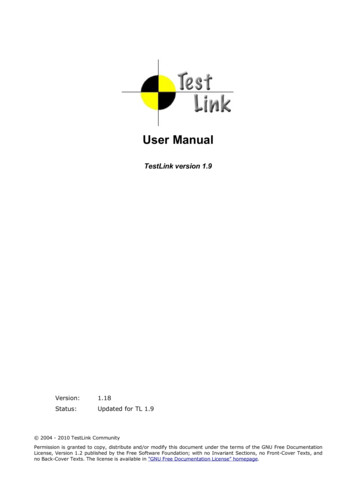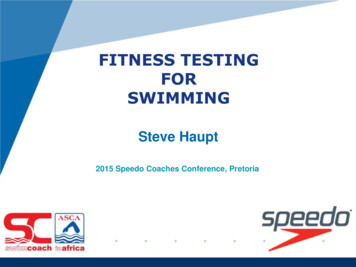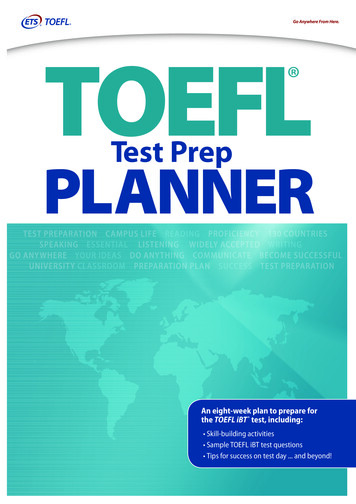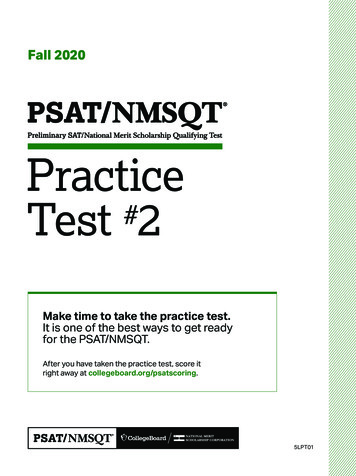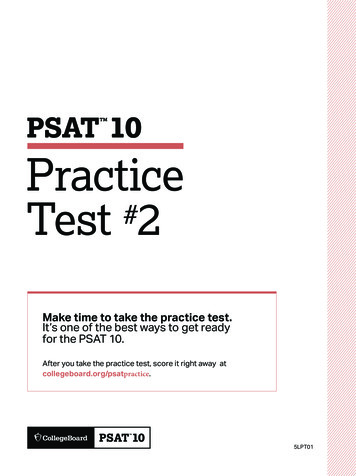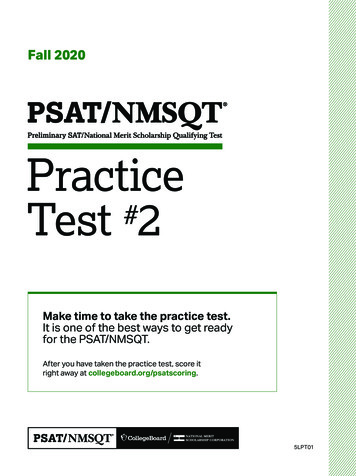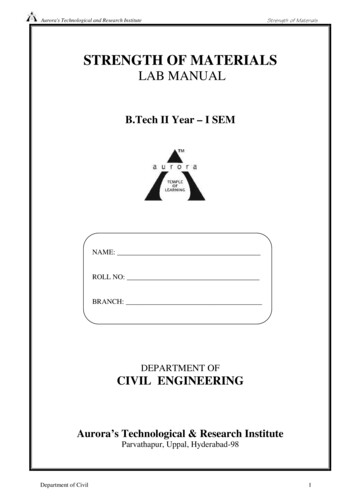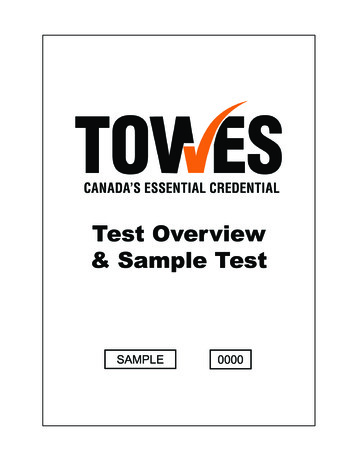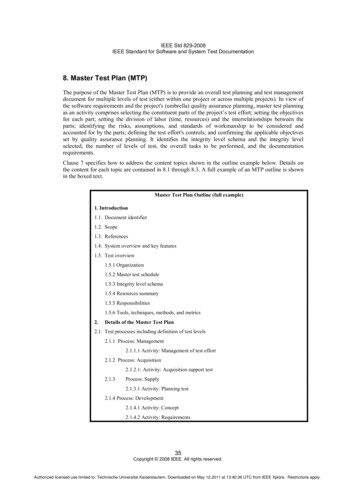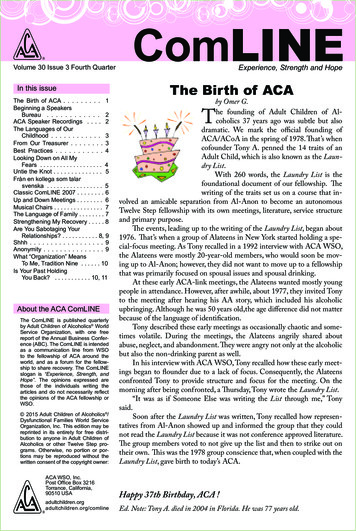
Transcription
abcdeifrhijklmnopVolume 30 Issue 3 Fourth QuarterIn this issueThe Birth of ACA . . . . . . . . . 1Beginning a SpeakersBureau . . . . . . . . . . . . 2ACA Speaker Recordings . . . . 2The Languages of OurChildhood . . . . . . . . . . . . 3From Our Treasurer . . . . . . . . 3Best Practices . . . . . . . . . . . 4Looking Down on All MyFears . . . . . . . . . . . . . . . . . . . 4Untie the Knot . . . . . . . . . . . . . . 5Från en kollega som talarsvenska . . . . . . . . . . . . . . . . . 5Classic ComLINE 2007 . . . . . . . . 6Up and Down Meetings . . . . . . . . 6Musical Chairs . . . . . . . . . . . . . . . 7The Language of Family . . . . . . . . 7Strengthening My Recovery . . . . . 8Are You Sabotaging YourRelationships? . . . . . . . . . . . 8, 9Shhh . . . . . . . . . . . . . . . . . . 9Anonymity . . . . . . . . . . . . . . . 9What “Organization” MeansTo Me, Tradition Nine . . . . . . 10Is Your Past HoldingYou Back? . . . . . . . . . . . 10, 11About the ACA ComLINEThe ComLINE is published quarterlyby Adult Children of Alcoholics WorldService Organization, with one free report of the Annual Business Conference (ABC). The ComLINE is intendedas a communication line from WSOto the fellowship of ACA around theworld, and as a forum for the fellowship to share recovery. The ComLINEslogan is “Experience, Strength, andHope”. The opinions expressed arethose of the individuals writing thearticles and do not necessarily reflectthe opinions of the ACA fellowship orWSO. 2015 Adult Children of Alcoholics / Dysfunctional Families World ServiceOrganization, Inc. This edition may be reprinted in its entirety for free distribution to anyone in Adult Children ofAlcoholics or other Twelve Step programs. Otherwise, no portion or portions may be reproduced without thewritten consent of the copyright owner:ACA WSO, Inc.Post Office Box 3216Torrance, California,90510 NEExperience, Strength and HopeThe Birth of ACAby Omer G. he founding of Adult Children of Alcoholics 37 years ago was subtle but alsodramatic. We mark the official founding ofACA/ACoA in the spring of 1978. That’s whencofounder Tony A. penned the 14 traits of anAdult Child, which is also known as the Laundry List.With 260 words, the Laundry List is thefoundational document of our fellowship. Thewriting of the traits set us on a course that involved an amicable separation from Al-Anon to become an autonomousTwelve Step fellowship with its own meetings, literature, service structureand primary purpose.The events, leading up to the writing of the Laundry List, began about1976. That’s when a group of Alateens in New York started holding a special-focus meeting. As Tony recalled in a 1992 interview with ACA WSO,the Alateens were mostly 20-year-old members, who would soon be moving up to Al-Anon; however, they did not want to move up to a fellowshipthat was primarily focused on spousal issues and spousal drinking.At these early ACA-link meetings, the Alateens wanted mostly youngpeople in attendance. However, after awhile, about 1977, they invited Tonyto the meeting after hearing his AA story, which included his alcoholicupbringing. Although he was 50 years old,the age difference did not matterbecause of the language of identification.Tony described these early meetings as occasionally chaotic and sometimes volatile. During the meetings, the Alateens angrily shared aboutabuse, neglect, and abandonment. They were angry not only at the alcoholicbut also the non-drinking parent as well.In his interview with ACA WSO, Tony recalled how these early meetings began to flounder due to a lack of focus. Consequently, the Alateensconfronted Tony to provide structure and focus for the meeting. On themorning after being confronted, a Thursday, Tony wrote the Laundry List.“It was as if Someone Else was writing the List through me,” Tonysaid.Soon after the Laundry List was written, Tony recalled how representatives from Al-Anon showed up and informed the group that they couldnot read the Laundry List because it was not conference approved literature.The group members voted to not give up the list and then to strike out ontheir own. This was the 1978 group conscience that, when coupled with theLaundry List, gave birth to today’s ACA.THappy 37th Birthday, ACA !Ed. Note: Tony A. died in 2004 in Florida. He was 77 years old.
News and ViewsBeginning a Speakers BureauAs the Speakers MeetingCoordinator for my Intergroup, I e-mailed a flyer toother Adult Children of Alcoholics (ACA) to inform themabout an up-coming speakerat a local meeting. One ACAfriend shared her experience,strength, and hope about howher Intergroup developed theirACA Speakers Bureau. Sincemy term limit is over for thiscommitment, I thought I’d passon the following information:Our Intergroup OfficeChair received many calls forACA members to speak toschools, Hospital and Institu tion (H&I) panels, and to other ACA meetings. The diffi culty in locating speakers wasreported to our Intergroup, sowe created an ACA SpeakersBureau.At an ACA SpeakersBureau orientation meeting,ACA members reviewed Traditions guidelines and collected contact information, topics, forums, topic preferences,and speaker availability. Wealso noted travel distances toschools, hospitals, jails, prisons,and other ACA meetings. OurSpeakers Bureau made ap-by John M.pointments to listen to speakerstories in order to match speakers with specific requests.Our Speakers Bureau invited ACA old timers and newcomers to speak at our ACAmeetings for members to experience what audiences mighthear. ACA members attendedthe special speaker event atschools/colleges, hospitals, in sti tu tions, and other ACAmeetings in order to get a feelfor the audiences. Special eventrequests often wanted speakersto take five or ten minutes tointroduce a topic, to tell themabout the ACA program, or tojust briefly tell their stories inorder for the audiences to hearnew perspectives.Each month our ACASpeaker Bureau was invited tosend a different ACA speakerto a nearby jail/rehabilitationcenter to be represented on aTwelve Step program panelconsisting of one member fromAlcoholics Anonymous (AA),CodependentsAnonymous(CA), Narcotics Anonymous(NA), and Adult Children ofAlcoholics (ACA) to sharetheir stories with inmates.When the ACA SpeakerBureau had more speakersthan invitations, we developedeight-hour marathons withspeakers addressing themedtopics on the inner child, lifeskills, sponsorship, relationships, money, and the ACATwelve Steps. Attendees donated 10 at the door. Moneyand relationships were hottop ics! The marathon was usedas an Intergroup fundraiser forprojects to help carry the message. At our Annual ACA Retreat/Convention, we suppliedspeakers who shared their stories of experience, strength andhope.Forming the Speakers Bureau has been an incredible experience. Perhaps your group,intergroup, region or statecould form a Speakers Bureau,too. State ACA Speaker Bureaus could connect with oneanother, opening up endlessopportunities to share positive growth with others in thispowerful program of recovery.Please feel free to send me(c/o litstaff@adultchildren.org)your experiences in speaking onbehalf of ACA at meetings, community venues, or in hospitals &institutions. Thank you! J. M. ACA Speaker RecordingsBelow is a list of a few links to recordings of ACA speakers for you to enjoy listening to their experience, strength and hope. ACA Convention 2005 http://www.acaconvention.org/html/2005 speakers.htm ACA Convention 2006 http://www.acaconvention.org/html/2006 speakers.htm ACA Convention 2007 http://www.acaconvention.org/html/2007 speakers.htm ACA Convention 2008 http://www.acaconvention.org/html/2008 speakers.htm ACA Convention 2009 http://www.acaconvention.org/html/2009 speakers.htm Arizona Intergroup http://aca-arizona.org/aca-speakers/ ACA Oregon Speakers http://acaoregon.com/2008-aca-recordings/The current version of this list is available at ?title Speaker Recordings2 Fourth Quarter ACA ComLINE
News and ViewsThe Languages of Our ChildhoodDid you knowthat WSOoffers nearly 100pieces of free literature in morethan a dozenlanguages?Did you know that adult children around theworld are continually adding to this by translatingliterature daily? And that much of this is availableon our website at no charge? Here’s how to findit:Go to adultchildren.org, and click onat the top of the page.Here you will find a treasure trove of valuableinformation, including “ACA Is ” as a web page,and a “Sample Meeting Format” to downloadand edit for your own meetings. “The LaundryList” link goes to a page that has been recentlyupdated to include “The Flip Side of The LaundryList”, “The Other Laundry List”, and “The FlipSide of The Other Laundry List”. These lists arethe focal point of The Laundry Lists Workbook,which will be available for purchase in October.You can also click on the “Select Language”link to see how WSO is committed to translating the ACA literature into the languages of ourchildhood. Our Multi-Lingual ACA Literaturepage links to dozens of PDF documents in bothUS Letter and A4 formats to download and print,with new pieces added regularly.The FAQ’s have been translated in variouslanguages, they can be found at http://www.adultchildren.org/faq. You can then click on “ SelectLanguage” and pick a language that is bolded.Translated books for purchase can be foundat shop.adultchildren.org/. Look for even more tobe added soon! The Editor has heard this: “Most ‘inner children’ need to read in the language of their own childhood to reallyunderstand information.”IFrom Our Treasurern keeping with the WSO Board’s intent of maintaining transparency in all financial matters,monthly reports are posted on the website’s Repository at rer.Seventh Tradition contributions are also shown in the “Donations Received” sub-tab.If you have any questions I can answer in future issues of the ComLine, please contact me.Yours in Service,Mary Jo L.ACA WSO ildren.org/Fourth Quarter ACA ComLINE 3
News and ViewsBest PracticesReady Set GO!!by The West Great Lakes ACA Intergroup RSG CommitteeWhat Is It? Ready Set GO is a tool that takes a member through the ACA TwelveSteps in four weeks. It is especially helpful before working our Twelve Steps Workbook. In the Chicagoland area we have been using it for a few years and also in Fitchburg,Wisconsin. We have had positive feedback from members who have taken ACA/ACOA/RSG. Now it is time to share ACA/ACOA/RSG with the greater fellowship to see howit is received.The full package is available on our website at s. Print it out (as it is, one-sided and in black and white) and try it out. Thereis a format to follow for groups. Promise Ten“Fears of failure and success will leave us, as weintuitively make healthier choices.”This is a picture ofme looking downon all my fearsand decidingto face themany way.by Bryon4 Fourth Quarter ACA ComLINE
SharesUntie The Knotby CariThe mother yelled, the father drank.The brother watched, the daughter sank.The string weaved itself, a family became.All around, next door, across town,Strings weaved, families cametogether, the same.Eyes stung as loudness prevailed, minds shrank.The anger, the drink, the doorsclosed with a yank.The string weaved, slowly, tighter, day by day.The knot created, without athought, child’s play?Family knot, family wrought.Grown-ups, the brother, thesister, bound in string.The knot of string, so tightly woven;anger, fights, neglect, follows, does,controls; what is this thing?Untie that knot, lay those strings side by side.Find out what was denied.Look at them one at a time, so innocentalone, but oh, how sublime.Untie that knot, set yourself free!Let yourself heal, let yourself be.Untie that knot, leave those stringsalone, we’ve come so far, ourpower is now our own.Untie that knot, it’s you who can.Our time is now, make your healthy plan. Från en kollega som talar svenskaHby Liisaej, jag heter Liisa ock mina föräldrar drack livet av sig. Jag bor i Östra Finland. Phyllis frågademig att skriva på svenska. Jag ska försöka: vi alla här lär det i skolan.Jag är mycket lycklig, för att jag har varit med i ACA för nästan 17 år. Mitt liv har förändrats såmycket! Jag har fått mitt liv helt ach hållet för mig själv. Jag lever mitt liv som jag vill.Tack för det fjärde steget vet jag nu hurdan jag är. Jag tror inte mer om någon anser att jag är dum,jag bara lär mig att jag har gjort något som den här människa tänkar är dumt. För mig det är en storskillnad.När jag börjage gå på ACA möterna ville jag inte lära känna människor. Jag bara talade ut minasorger ock gick ut. Men över tiden öppnade jag mig till andra, gick med till tjänsten ock småningomACA har blivit en stor del av mitt liv.Här i Finland har vi ganska många veckosluten per år när vi aca människorträffar varandra. På dessa ACA retritter arbetar vi med stegen eller känslor påolika sett. Vi skriver ock ritar med den svagare hand, vi dansar, spelar, vandrari skogen ock lekar med snö, talar till snögubbarna som tar olika roller och såSwedenvidare. Den stora röda boken, som vi kan läsa på våra modersmål, ger hela tidennya ideer ock inspirerar os. Allt det har hjälpt mig att växa till en ny människa. Jag vill inte mer levautan ACA. Förut har jag många gånger blivit “färdig” ock lämnat ACA, men livet har serverat mignågot svårt och tagit mig tillbaka.Nu lever jag i en gammal skol mit i skogen, långt borta från stan. Jag kallar mitt hem “Eheytys”,Defragmentering. Med min ACA grupp Polvijärvi organiserar vi här ACA retritter och människorkommer hit från hela landet. Det är så fint!I september ska vi tre finnar resa till Arizona, Mingus Mountain ACA retritt. Det är så spännande!Jag hoppas att ha många år med ACA och se den växa i hela världen. Jag tackar Heli för hjälp medskrivning. Fourth Quarter ACA ComLINE 5
SharesClassic ComLINE 2007by unknownEven Though . . .My parents weren’t available to me, I can be.My parents couldn’t admit that I had needs, I can.My parents were in denial, I don’t have to be.My parents couldn’t meet my needs. I am learning to.My parents couldn’t say “I love you” when they were sober,I can admit my love without being drunk.My parents used alcohol to hide their feelings, I can admitthat I have feelings, and I can let them in.My parents used alcohol to avoid listening to that still, smallvoice; I can sit still and listen, even when I’m afraid of whatI will hear.My parents didn’t treat me as a real person, I am learningto recognize and admit my own worth.My parents used alcohol to avoid change; I can beopen to possibilities without panic.I was raised in a home of denial, I don’t live there anymore. Promise Eleven“With help from our ACA support group, we willslowly release our dysfunctional behaviors.”Up and Down Meetingsby Phyllis R.The meeting I’ve been going to for the last 14years has had ups and downs in attendance.Every once in awhile, I get a phone call fromsomeone asking is your meeting still going? Theysaw my phone number either in the newspaperor on the web site for ACA. And I always sayyes. And sometimes even with a call, they don’tcome. Still, the foundation for my meeting isme and maybe one or two others. Sometimes, agroup from a rehab program will swell the numbers in attendance. It’s always great to have themeven though their main program is not workingon emotional sobriety. It can be a little discouraging that more people don’t come to ‘my’ meeting. ACA has so much to offer.Of course, it’s not an easy program. No oneis going to be healed miraculously. It could happen. Still, I like seeing new people show up. Manyhave been to an ACA meeting years ago, usuallybefore the publishing of our Big Red Book. Theyare surprised to find that there is such a manual.Sometimes they buy it — I always have some6 Fourth Quarter ACA ComLINEavailable for purchase since I want people tohave them as soon as possible before they beginto think about not buying it.And when they don’t come back to ‘my’meeting I wonder. What could I do? Once Iasked a person who had come a few times thatquestion. He responded from his own experiencethat we shouldn’t be quite so welcoming. He wasshy and perhaps was overwhelmed. I can’t stopbeing me so if I overwhelm someone, that’s notmy problem, sadly. I just keep attending for meand hopefully knowing that I’m planting seeds.Maybe they will sprout.
SharesMusical ChairsPby Christine B.art of my ACA recovery is recognizing when I am acting based on a feeling from the past. Changeis only possible if I first feel the feeling, which means coming out of denial. As a writer, I can often“right size” these feelings by writing about an image or event that expresses the feeling. For example,I have a regular recovery breakfast at a local diner and I’m always afraid there won’t be room for me(abandonment). I realized that the game “Musical Chairs” is a perfect example of how this feels:When I was five, when I hadDisneyworld, or beach vacation, orone pink party dress, one pairGood Job, Sweetie. You’re the best—.of white socks with eyelet trim,The music stopped. Stunned by silence.when life seemed filled with not enough.Pause. And in that pause, the other cleverA party game that seemed designedchildren, grabbed a chair, nudged meby monsters or an evil witch.over, sat down quick.Peppy music played, I skipped aroundI stood. They stared.a row of chairs, anticipatingSome kindly grownup took my handcake and goody bags.and leaned me up against the wall.As soon as I was lulled into my roleWhere I’m still standing, in the land ofin this fairy tale, as soon as I heardnot enough to go around. The Language of FamilyIby Cathy M.never thought about it really that besidesEnglish, I might have learned another language while growing up. I was trying to understand the origins of my anger, rage, and unhealthyinteractions, when suddenly my background inlanguage and language learning came to mindand stopped me dead in my tracks. Grammaticalstructures are as dear to me as the expressionsthey represent, so framing anger and brokennessas a language learned brought an understandingthat just hadn’t been in my head before. I realized I learned how to speak both English anddysfunction as a child and how being bilingualmeans communicating with the phrases and expressions native to my spoken tongue, as well aswith the anger, rage, and pouting silence of mysecond native language.“I ain’t wrote my homework yet,” I mighthave said to Mom. “Honey, it’s ‘I haven’t written’,” she says, and with a smile and eyes full oflove, she explains how a language has tenses, andhow they sometimes change, and how it’s ok tomake mistakes.Didn’t happen Mom was a writer by trade,well versed in the intricacies of language, andshe used that knowledge handily — mainly tomaintain her separateness and prove her elevated status from those of us vying for her affection.Wearing a cloak of silence and fear throughoutmy childhood buried any feelings I might havehad about being constantly corrected. So nowI know where to put my commas (and yours,too, I’m sorry to say), and I say “haven’t written”instead of “ain’t wrote”, but sadly, I also shakemy head in scorn while correcting those dearto me with the fluency of a native speaker ofdysfunction.Some contend that a soul is born with eachnew language learned that as you learn Italian,pasta dishes find a place next to hamburgers, andthat Tchaikovsky and Elvis shake hands whilemastering Russian. Sadly, however, while acquiring the nuances of dysfunction, denial, isolation,guilt, and fear find their place right smack inthe middle of every word and every relationship. Personally, I’ve come to realize how, withthe fluency of a native speaker, my accents rangefrom mad victim to silent pouter and others inbetween when speaking dysfunction.As children, we grow into fluency by making mistakes. As adults, we refine our nativefluency with the passing of years. As an adultchild of two alcoholics, ACA has been helpingme review the grammar and syntax of my secondnative tongue and become aware of the manyaccents of my dysfunction. With this growingawareness, thankfully, I gradually begin to speaka language of serenity and peace unknown untilnow. Fourth Quarter ACA ComLINE 7
SharesStrengthening My Recoveryby Phyllis R.Most every morning, I read from the ACA Dailey Meditations bookto start out my day in a positive way. Today’s (May 13), talks aboutrandom acts of kindness. I know when I first started out in ACA I couldhardly take care of myself, let alone think about ‘helping’ others.Now it’s not hard at all to smile at people or let someone in line aheadof me at a store when they have one item and my basket is full. That’s oneof the lovely things about ACA. My outreach is growing and I am takingmuch better care of myself. I still need to work on a variety of things, andthat’s okay. I’m not perfect. I am lovable and capable (IALAC) so I don’thave to BE perfect. My Higher Power is always with me, even when I don’tthink about HP. Are You Sabotaging Your Relationships?Hby Francis Bow are your relationships?Business? Person-al? Family? Friendships? Romantic?Yourself? Any issues? Any recurring patterns? The first reactionis to blame it on the other party.It’s easier to see the faults inothers than in ourselves. Thoughrelationships take two to tango.We must have had something todo with it. They say most of ourproblems are of our own making. So how do we honestly lookat our part in our relationshipsand take responsibility for themso we can change and improveall of our relationships?100% of relationships havesome level of dysfunction, somemore than others. That’s becausenone of us were raised in ahealthy family. If we didn’t getall of our needs met as children,we were abused. This abuse leadsto codependency. There aremany aspects of codependency.Thoughcodependencyisfocusing outside of our selfto meet our needs instead ofmeeting our own needs. JohnBradshaw says codependencyis people addiction. PiaMellody says codependency isemotional immaturity. We’re8 unable to stand on our owntwo feet and need to rely onothers. There are many waysthat we do this. Because of aninsecure childhood, we mighttry to control others. If wewere abandoned as children,we might fear abandonmentand people please others. If wewere shamed or criticized aschildren, we might fear others’criticism and anger and avoidconfrontation and standing upfor ourselves. If we were blamedas children, we might learnto blame others. If we weren’testeemed as children, we mighthave low self-esteem as adults,letting others treat us poorly,treating ourselves poorly ortreating others poorly. If thereweren’t boundaries growing up,we don’t have boundaries asadults, letting others offend usor offending others. If we wereneglected as children, we mightbe too needy of others. If wewere enmeshed as children, wemight feel smothered by othersand push them away. If we wereoverly responsible as children,we might feel overly responsibleto take care of others, caretaking,rescuing and enabling them. AsFourth Quarter ACA ComLINEyou can see, how we were treatedas children affects how we relateto others as adults affecting allof our relationships. All of theseactions are abusive, dishonest,manipulative,controlling,and avoiding. We’re alsoabandoning ourselves, focusingon others and their feelings andneglecting our own. This usuallyleads to resentment and passiveaggressiveness. So how do wechange?There are many ways tochange. Pia Mellody says weneed to get our history straight.John Lee says we need to growup. Counseling addresses ourhistory, how it infected us thenand how it continues to affectus today. Twelve Step programslike CODA (CodependentsAnonymous), help us recoverfrom codependency and ACA(Adult Children of Alcoholics/Dysfunctional Families), helpus recover from our childhoodabuse. In ACA, we learn to reparent ourselves and give ourselves what we didn’t get fromothers. We learn to stand on ourown two feet and be responsiblefor ourselves and take care ofourselves so we don’t need oth-(continued on page 9}
Shares(continued from page 8}Are You Sabotaging Your Relationships?ers to take of us. We also let others be responsible for themselvesand take care of themselves. InCODA, we learn to esteem ourselves through affirmations. Welearn to set boundaries, protecting ourselves and not offendingothers. Our relationships become more loving and honest.Do any of your relationships have problems? Are thererecurring patterns? Are yousabotaging your relationships?Are you responsible for yourpart? Are you doing what youneed to do to change? Whynot? Don’t you want better relationships? It starts with youbeing a better person. There aremany things you can do. All ofyour relationships will improve,starting with the most important relationship with yourself.And if a relationship doesn’timprove, you can choose not tobe in it. Here’s wishing you better relationships. Ed. Note: ACA’s Fourth Traditionstates, “Each group is autonomousexcept in matters affecting othergroups or ACA as a whole. Wecooperate with all other TwelveStep programs.”Shhhby Charles E.Anonymityby Eileen W.the “elevated” women remembering that I wasn’tn thinking back about this topic, anonymityworthy. And it had seemed just fine with her tohad more than one gift for me. First, it madetalk to me. And I got it. Somewhere along theit safe for me to be in recovery. The alcoholics inway, I had grown and the pedestal had shrunk.my life wouldn’t know where I was going andWe were now all on the same plane.what I was doing. But the other safety factor wasAnonymity had kept me safe until I got thefor my personal identity. All I needed to sharemessage from my Higher Power that I was okay.was my first name. I didn’t have to share myHe has created all of us as individuals. I didn’tfamily life or my work experience, so the otherhave to be like my brother to curry my Mother’speople in the meetings couldn’t know about myfavor. My assignment from God was to becomesense of worthlessness.myself. And that was what I was learning how toIn the beginning I set everyone else up ondo in recovery I was getting acquainted witha pedestal. Some people were so high up on thepedestal that I never dared to talk with them. the true self God made here in me, and I wasacting on it. ACA is not only a program of reBut I did learn from them and all the others whocovery, it’s a program of discovery! shared their stories. The time came when oneday I realized that I had just spoken with one ofIFourth Quarter ACA ComLINE 9
SharesWhat “Organization” Means To Me,TRADITION NINEby Cari G. D.During my 20 year career, I worked formany “organizations”. During my childhood, I was a family imposed member of a religious following, yet another “organization”.Before I knew the impact of the dysfunctional,alcoholic family on me, I struggled with the rigidity, rules, hierarchy, and control of all those“organizations”, and tried to force fit myself intothose rules and regulations by becoming a wellknown “organizer” who cajoled and manipulated teams into believing in shared goals andoutcomes. When I crossed paths with someonewho would not adhere to my organizing efforts,the shared goals philosophy, and my way of making things happen, I would become disgruntledand openly difficult, throwing up my hands indisgust, and expecting higher ups to step in and“force” that individual to comply. It was a vicious cycle of dysfunction, and my definition of“organization”.When I finally went to therapy in searchof “what’s wrong with me”, my therapist and Iworked on delving into my childhood where itwas discovered I am an adult child of alcoholism and family dysfunction. While the therapyhelped immensely, I wondered if there were other people like me, affected by their childhoods inthe same way. I asked my therapist, and that washow I was introduced to ACA.My first thoughts were, “oh no, not anotherorganization”. Immediately I reverted to feelingsof oppression, and wanting to avoid all thosemixed bad emotions. I avoided attending forweeks, and when I finally did attend, I hesitatedin participating, still very skeptical of what this“organization” was all about. I couldn’t believethat there existed a worldwide group that claimsit’s not “organized”.What I eventually let myself discover wasthat, yes, this is a group that really is not mydefinition of organizations. There really are no“authority” figures, no rigid rules, no hierarchy,or any one person or committee we all have toanswer to. This is a worldwide organization ofloving, caring, supportive people who share acommon history. It really breaks the mold ofwhat we have been used to and have acceptedas meaning “organization”. There are guidelines,and other practices which are necessary in orderto conduct business, but none of that interfereswith or negatively influences the trust that isbuilt in to the structure of ACA.I was suspicious at first, but now fully graspthe lack of formal organization and how the onlyauthority figures in ACA are my own HigherPower and myself. I am an ever grateful participant in my weekly group meetings where we express support for one another, and continue ourhealing process, without rigidity, formal organization, or layers of hierarchy, because after all, weare adult children. Is Your Past Holding You Back?There is a famous saying that those who don’tknow history are destined torepeat it. Well, the same goesfor our personal history. If wedon’t know our personal history, we are destined to repeatit. And if our history has issueslike most of us, we’re going tocause our own future issues.We all need to recover fromsomething. We can recover10By Francis B.from our past and change ourfuture by facing our history.Ma
Alcoholics Anonymous (AA), Codependents Anonymous (CA), Narcotics Anonymous (NA), and Adult Children of Alcoholics (ACA) to share their stories with inmates. When the ACA Speaker Bureau had more speakers than invitations, we developed eight-hour marathons with speakers addressing themed topics on the inner child, life skills, sponsorship, relation-
